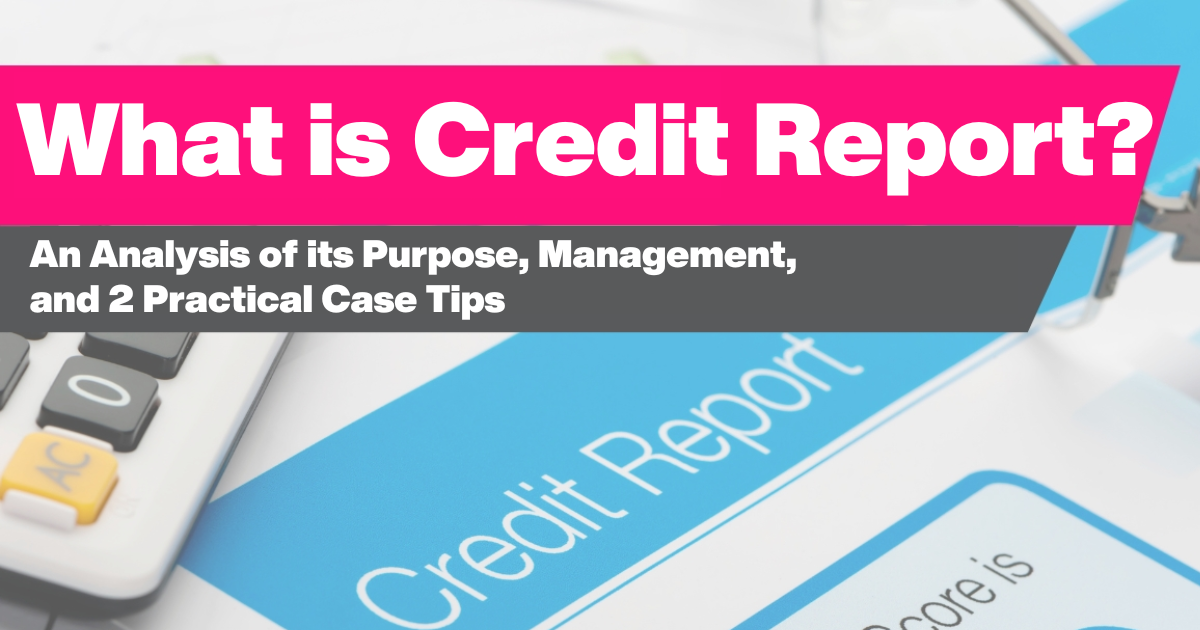What is Credit Report – An Analysis of its Purpose, Management, and 2 Practical Case Tips

Credit reports can be applied in various scenarios that may affect different aspects of daily life. However, the functions and practicality of credit reports are not prevalent. With the introduction of Credit Data Smart (Multiple Credit Reference Agencies Model) in Hong Kong, the credit reference service market will undergo new service experiences and reforms, changing how credit reports are accessed and managed. In addition to analyzing the functions and practical cases of credit reports, this article will also explain the management techniques and rights of a credit report holder.
What is credit report?
A credit report is a comprehensive record of your financial credit activities that reflects your financial status. In addition to personal information such as public records, addresses, and phone numbers, a credit report includes payment history, debt burden, credit mix (including length and type of product holdings), new account and general / enquiry records. It is worth noting that if there are relevant legal proceedings records related to bankruptcy and debt collection, such information will be presented in the credit report.
Therefore, a credit report is like a health check report of financial status. It shows your credit history, credit score, and financial reputation to credit providers.
Extended Reading: What is Credit Score? New Credit Score Standard Helps Reflect Credit Report Status and Align with International Standards
The Purpose and Importance of Credit Reports
When you apply for a loan (such as a mortgage loan, car loan, or credit card), banks or financial institutions may need to evaluate whether you are a reliable borrower. They will refer to credit report information to understand your financial responsibility and credibility.
Credit reference agencies use sophisticated statistical models and credit scoring to summarize your financial reputation in a simple way. Credit providers mainly refer to the credit score to understand your credit status and assess your repayment ability and default risk.
For example, the most direct impact of credit reports is the mortgage loan interest rate and loan-to-value ratio, as well as the chance of approval and credit limit for credit card applications.
Importance of regularly reviewing your credit report
Regularly reviewing your credit report not only confirms the accuracy of your credit history but also allows you to use it as an effective tool for credit activities and financial monitoring. Individuals can develop financial plans that suit their needs, control personal spending and repayment habits, and avoid defaulting on debts that could affect borrowing opportunities and amounts when necessary.
In addition, the rise of the internet has brought about different forms of financial crimes, with the most common cases being fraudsters stealing or faking identities to borrow money and then absconding. This can put victims at risk of financial reputation damage and monetary loss without their knowledge. Therefore, credit reports can effectively monitor abnormal borrowing activities, identify and prevent personal identity theft early, and reduce the series of life problems that arise from financial losses and reputation damage.
Reliable and legitimate sources of credit report information
According to the guidelines of “Credit Data Smart”, the credit reference services are governed by a legitimate and reliable mechanism, which ensures the security and proper use of credit data for Hong Kong citizens.
The following are examples of requesting credit reports and related information:
- Data Subject (Yourself)
Consumers can obtain their credit reports from credit reference agencies.
- Credit Providers (such as banks or financial institutions)
Under “Credit Data Smart”, credit providers must transmit personal credit data in encrypted form through the “Credit Reference Platform”. Therefore, if banks or financial institutions want to access personal credit data from a credit reference agency, they must participate in “Credit Data Smart”.
Example 1: Credit Report for Property Mortgage
Credit scores and credit reports are significant to our daily lives, so we should get into the habit of checking them regularly. Once we need to raise funds and apply for loans from financial institutions, credit reports will come into play, and the most common scenarios are property mortgages and credit card applications.
Suppose a mortgage applicant is preparing to purchase a property with a market value of HK $10 million and applying for an 80% mortgage loan from a bank, which is HK$8 million, with a repayment period of 25 years and monthly installment payments. The bank needs to evaluate the repayment ability of the applicant within the repayment period of 25 years. In addition to reviewing the applicant’s credit data, the bank may also need to assess the applicant’s credit record and data. Therefore, the bank needs to obtain a reliable credit report. By using the credit score and related credit records in the credit report, the bank can fully understand the applicant’s credit history and evaluate their ability to repay on time.
If the applicant’s credit report shows multiple instances of overdue payments in the past, the bank may reduce the loan amount and even increase the interest rate to compensate for the default risk. Thus, the requested mortgage loan amount of HK$8 million may be reduced to HK$7 million, and the interest rate may be raised from 3% to 3.5%.
On the other hand, if the applicant’s credit report shows a good repayment record in the past and has stable employment with professional expertise, the bank may approve the full mortgage loan of HK$8 million and even lower the interest rate from 3% to 2.5%. This can attract the applicant to choose the bank’s mortgage loan.
Therefore, credit reports can provide consumers with better offers, save interest expenses, obtain a more significant approved loan amount to achieve their financial goals.
Example 2: Credit Report for Credit Card Application
The business model of credit cards is that when a consumer purchases at a merchant using a credit card for payment, the relevant purchase amount is first paid by the card issuer (such as a bank or financial institution) to the merchant. The consumer needs to repay the purchase amount (i.e. the credit card debt) to the card issuer before the payment due date, and the merchant pays a service fee to the card issuer, which is similar to interest. Finally, the card issuer can receive the payment amount with interest, while the consumer enjoys the convenience of shopping payment, and the merchant gains more business opportunities.
However, not every credit card applicant can have the same offer from the card issuer. For example, some consumers use credit cards for purchases and shopping beyond their financial capacity, ultimately leading to a decline in their credit score due to failure in the repayment of credit card debt before the payment due date.
When these consumers apply for a credit card from another card issuer which may not know the repayment record of the credit card applicant. Therefore, the card issuer usually checks the credit report of the credit card applicant from a credit reference agency during the application review process to make credit decisions and manage risks. The issuer will refer to the credit score and credit record to determine whether the applicant has the ability to repay before approving the credit card application. If the applicant’s credit record is poor, even if the credit card application is approved, the credit limit may be restricted, such as reducing the standard credit limit by half to reduce the risk of default by the credit card holder and balance interests and losses.
On the contrary, if a credit card applicant with a good credit record wants to increase the credit limit, the credit report can be one of the convincing proofs.
The benefits of credit reports to consumers, keep abreast of new credit report information to reduce credit accidents
Regularly checking a credit report is important, but it is also necessary to pay attention to details and shortcomings. In the past, credit scores in Hong Kong were presented based on the situation at the time of purchase, but there will be bias or inaccuracies between the time of purchase and third-party review that may cause delay of criminal activities such as identity theft for borrowing and lending.
Under the MCRA model, financial institutions can access more than one credit reference agency for credit evaluation of customers, and the credit scoring model and scores used may be different. Therefore, the MCRA model can provide comprehensive data analysis to assist financial institutions in making in-depth, holistic, and complete credit evaluations.
More changes in the credit evaluation and presentation methods are expected under the MCRA model. However, it will not increase the burden of credit applications for consumers.
With the introduction of the MCRA model, Nova Credit (NOVA) will be committed to providing more accurate, innovative, and market-oriented credit reference services to the public. If you want to receive the latest information on credit data services, stay tuned to NOVA’s social media and website updates.
Download NOVA PASS for Free Credit Report Now
Frequently Asked Questions (FAQs)
1. What is credit report?
A credit report is a comprehensive record of your financial credit activities, reflecting your financial status. It is like a medical report on financial health. It shows your credit history and, through credit scoring, presents your financial reputation to credit providers.
2. What information is included in a credit report?
A credit report typically includes two main sections of information: personal information and credit history. Personal information includes public records, addresses, and phone numbers, while credit history includes payment history, debt burden, credit Mix (include length and type of product holdings), new account and general / enquiry records. It’s important to note that if there are any bankruptcies or legal actions related to debt collection, they will also be listed on the credit report.
3. How to check credit report? Who can access credit reports?
Checking a credit report is relatively simple. The owner of the credit report (data subject) can submit an application to the CRA in accordance with their requirements to provide identity documents. However, under the Hong Kong Personal Data (Privacy) Ordinance, credit reference agencies must follow the relevant guidelines and regulations in order to allow the data subject, lenders, or designated parties to access the credit reports. For example, the credit report can be provided to relevant parties (including organizations) based on a court order.
以上內容僅供參考,並不構成任何法律、財務、投資或其他專業意見。閣下在作出任何決定前,應先尋求第三方專業意見。
The above information is for reference only and does not constitute any legal, financial, investment or other professional advice. Before making any decision, you should seek professional advice from third parties.








